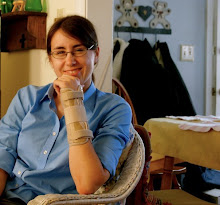The tenor of the political debate in the United States has been the subject of much commentary over the last couple of years, but it's been a growing problem since much longer than that. Before the birthers and the Tea Party, there were anti-war protesters who compared Bush to Hitler. Disagreement can become dangerous territory when it turns into extremism. This is true of politics as well as of religion and many other important facets of life.
I do think, though, that no matter how long this has been going on (and I would argue that in the US, you can date it back to the days of the Articles of Confederation), the rhetoric has sharply deteriorated in the last several years. At the end of this article, ThinkProgress.org offers a (partial) list of articles analyzing recent instances of violent action and even more violent rhetoric. The Republican party has been especially guilty of this; the Tea Party elements even more so.
Rhetoric does not inherently lead to action; sometimes it's just talking. I follow the tweets of the (fictional) President Bartlet on Twitter, and yesterday he commented,
No motive released. Far as I can tell, it was an act of a mad man. Trying to explain it through normal terms is an exercise in futility.
Perhaps he is right. Time and evidence will ultimately tell-- and all we have right now are the shooter's MySpace page and YouTube videos. But I think that rhetoric does have power, and the level of debate and discussion in this country is appallingly low. Rep. Giffords was disliked in some measure by people on both sides of the aisle; according to a New York Times article, both the conservative SarahPAC and the liberal Daily Kos were compelled to scrub their websites after yesterday's tragic shooting. Indeed, the shooter listed both The Communist Manifesto and Mein Kampf among his favorite books. Blame is not always easy to assign.
Life is strange in how events run together sometimes. A couple of days ago I learned that the Westboro Baptist Church plans to protest my university on Friday. I hesitate even to link to the press release on their website; the flyer is so full of bile that it hardly merits reading (I also hate to drive up traffic to them; go read it if you wish). Though they are a small and insular religious group, they are tremendous agents of intolerance. I disagree with and indeed despise everything they stand for, and so I will join the members of my university community in their counter-protest. But I will do so in the spirit of what my university chaplain wrote a few days ago--
Often overlooked in our religious conversation is the fact that love is not an emotion. Love is a behavior. It is a way of living. That’s a good thing—meaning that it is not outside the realm of our choosing. We can, in spite of how we might feel, choose to love. Somewhere deep down in my animal nature, I am not happy about that. But my higher nature calls me to something else. That much tarnished image of God with which I was made still has enough luster now and then to remind me of what I am called to do.
The Westboro Baptist Church brand of hatred is the kind that leads them to protest a university. It is not clear yet what was in the mind of the man who shot Rep. Gabrielle Giffords' and those who died in the gunfire (including a federal judge), but I suspect it was also motivated by hatred. What else could it be?
Responding to hatred with hatred is counterproductive. As Giffords campaign volunteer Ilene Thompson said, there are real consequences to hatred, and we saw them yesterday. Love must prevail. Love, as an action, means that on Friday I won't yell obscenities at the Westboro Baptist Church. It means I'll join the God Loves Poetry movement in trying to turn their discourse on its head. Words matter-- we can and should use them well.
Love, as an action, also means ending a political discourse that involves using the language of violence to talk about the other side of the aisle. Humans have historically been very good at turning people with whom we have differences into the "other"; when we think of another person as the "other" we have an easier time justifying violence against them. This must stop. Love, as Rev. Schaefer wrote, must win out. The tenor of debate must be raised. As President Bartlet of The West Wing would remind us, that starts with us, right now. An article in the New York Times speculated that this shooting could mean "the end of an era of intolerance, or just the beginning." What's next?

2 comments:
Carolyn, this is a wise essay, and I am worried about the WBC somehow using the events of yesterday to heighten their public vitrole.
I do not think love is the opposite of hate; I believe that indifference is. I think what the chaplain said is very wise.
Terrific piece of writing.
Check out Joan Walsh's essay on Salon on the same topic, though it is a little long.
AA
Post a Comment